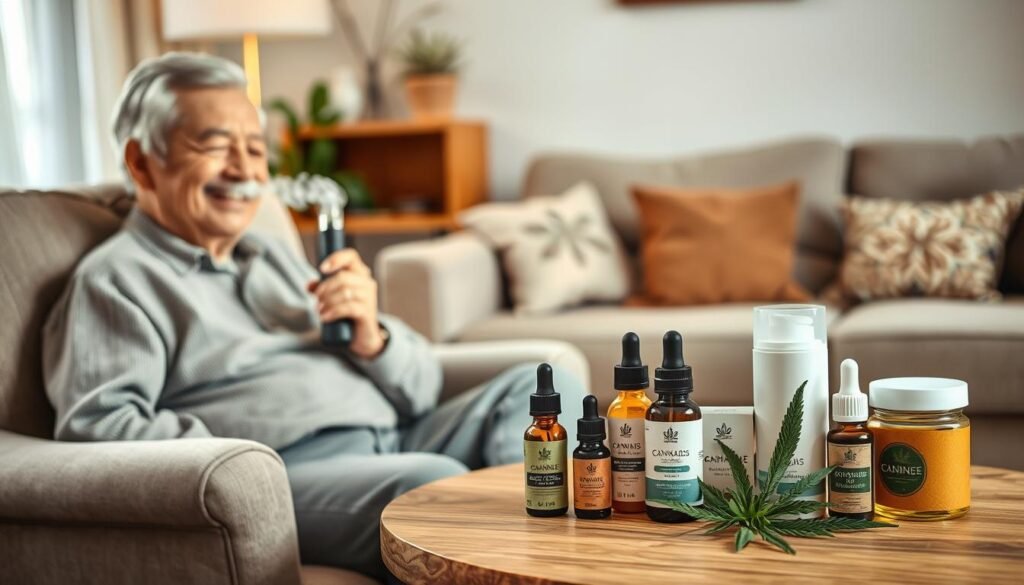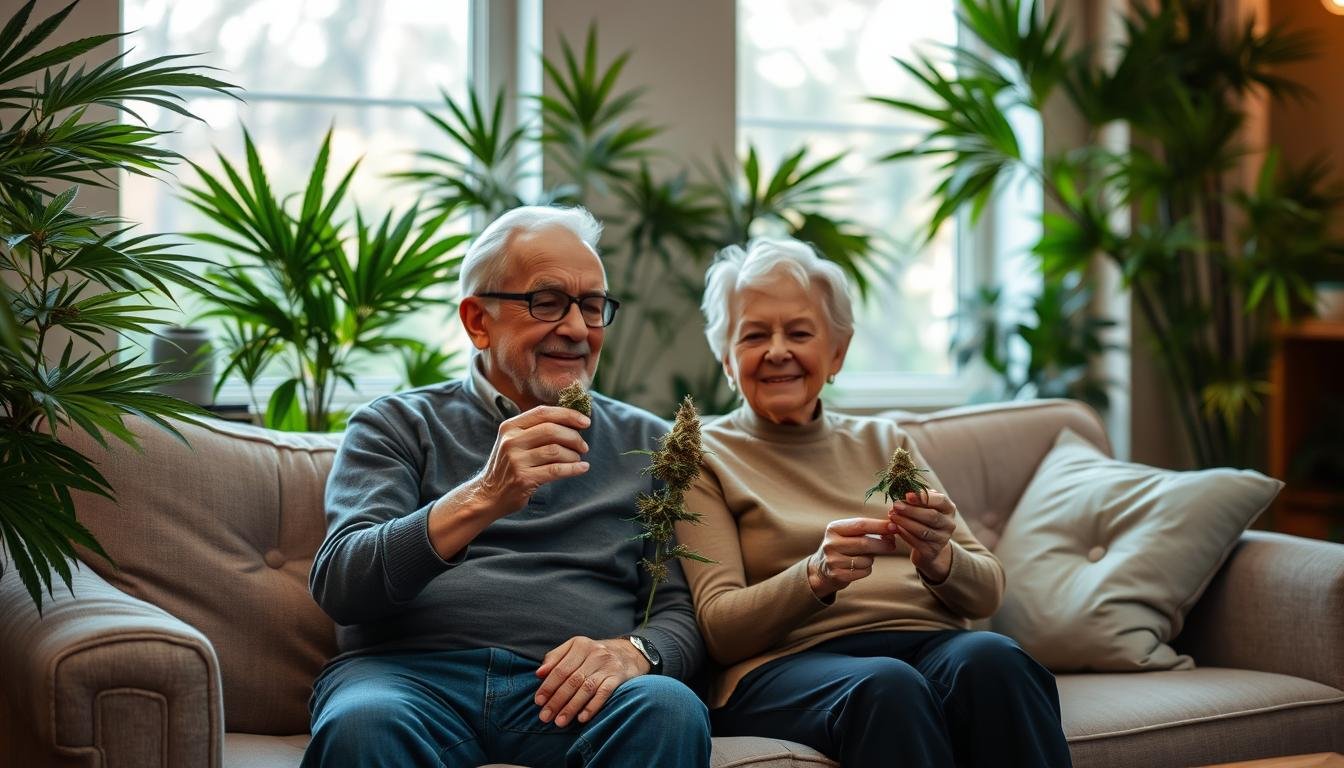Are older adults turning to cannabis for wellness? Recent studies show a big change. Now, 7% of adults aged 65 and over use cannabis in a month.
This trend makes us wonder about cannabis’s role in seniors’ lives. As more older adults try cannabis, we need to learn how to use it safely and effectively.
Key Takeaways
- Growing trend of cannabis use among seniors.
- Need for education on safe and effective cannabis use.
- Research is crucial for understanding cannabis wellness.
- Seniors are exploring cannabis for various health reasons.
- Understanding the benefits and risks is essential.
The Rise of Cannabis Use Among Older Adults
Cannabis use is growing among older adults. This is due to changing views and demographics. More seniors are looking into its health benefits.
Current Statistics and Demographic Trends
Research shows more older adults are using cannabis. This is true for those who are well-educated, married, female, and have higher incomes. The data indicates a steady rise in cannabis use among those aged 65 and older.
| Age Group | Percentage Using Cannabis | Most Common Reasons |
|---|---|---|
| 65-69 | 12% | Pain management, sleep improvement |
| 70-74 | 8% | Anxiety relief, chronic pain |
| 75+ | 5% | Arthritis relief, mood enhancement |
Breaking the Stigma: Changing Perceptions
The stigma around cannabis is fading. More seniors are learning about its benefits. Educational efforts and easier access are helping. This makes them more open to talking about it with doctors and finding stoner wellness tips.
Understanding these trends helps us support seniors. We can help them make informed choices about using cannabis for wellness.
Understanding Cannabis for Seniors: Basics and Terminology
Seniors looking into cannabis for wellness need to know the basics. Cannabis is a complex plant with many compounds. It offers health benefits, which are great for older adults. To use it well, seniors should learn key terms and concepts.
Cannabis has over 100 cannabinoids, with CBD and THC being the most famous. Knowing the difference between these two is key for safe use.
CBD vs. THC: What Seniors Should Know
CBD (cannabidiol) and THC (tetrahydrocannabinol) are the main cannabinoids in cannabis. THC is psychoactive, causing the “high” from cannabis. CBD is non-psychoactive, offering health benefits without the high. Seniors often choose CBD for its health perks, like pain relief and anxiety reduction.
- CBD is used for therapeutic benefits without psychoactive effects.
- THC is psychoactive and can produce a “high.”
- Seniors often prefer CBD-rich products for health benefits.
The Endocannabinoid System and Aging
The endocannabinoid system (ECS) is key for health, more so as we age. It controls functions like pain perception, mood, and inflammation. As we get older, the ECS might not work as well, leading to health problems. Cannabis works with the ECS, which is why it might help seniors with weed pain relief and better wellness.
“The endocannabinoid system is involved in a wide range of physiological processes, making it a promising target for the treatment of various age-related diseases.”
By grasping these basics, seniors can wisely use cannabis for wellness. This could improve their life quality.
Health Benefits of Cannabis for the Aging Population
As more people get older, cannabis is becoming a possible solution for many health problems. It’s gaining popularity among seniors because it can help with various age-related issues.
Managing Chronic Pain and Inflammation
Cannabis is effective in managing chronic pain and inflammation, common in older adults. Research shows that cannabinoids can lessen pain and enhance life quality for those with arthritis.
Improving Sleep Quality and Combating Insomnia
Many seniors have trouble sleeping, and cannabis might help. Certain cannabinoids can help regulate sleep and improve rest quality.
Addressing Anxiety, Depression, and Mood Disorders
Mental health issues are common in older adults, and cannabis shows promise. It can help with anxiety, depression, and other mood disorders by promoting calm and well-being.
The health benefits of cannabis for seniors are significant. It’s an important area to consider for those wanting to improve their life as they age.
| Health Benefit | Description | Potential Impact |
|---|---|---|
| Managing Chronic Pain | Cannabis reduces pain and inflammation | Improved quality of life |
| Improving Sleep Quality | Cannabinoids regulate sleep patterns | Better rest and recovery |
| Addressing Mental Health | Cannabis promotes calm and well-being | Reduced anxiety and depression |
Weed Pain Relief: How Cannabis Addresses Age-Related Discomfort
Cannabis is getting more attention for managing pain in older adults. As people get older, they often face health problems like chronic pain and arthritis. Cannabis is seen as a good option for those looking for alternatives to traditional pain meds.

Cannabis works with the body’s endocannabinoid system to help with pain. For seniors, this means relief from pain without the side effects of some medicines.
Arthritis and Joint Pain Management
Arthritis is common in older adults, causing joint pain and stiffness. Cannabis has been shown to help manage this pain. Studies say it can reduce inflammation and ease arthritis pain, improving life quality.
Neuropathic Pain Solutions
Neuropathic pain comes from nerve damage and affects many seniors. Cannabis, with high CBD levels, can help with this pain. It’s a good option for those who don’t get relief from other pain meds.
Alternatives to Traditional Pain Medications
Cannabis is a good alternative to opioid pain meds. For seniors, who are more at risk from opioids, cannabis is a safer choice for chronic pain.
In conclusion, cannabis is a promising option for weed pain relief and cannabis wellness in seniors. Understanding its benefits can help older adults make informed choices about using cannabis for health.
Cannabis Wellness Strategies for Seniors
Seniors are discovering the benefits of cannabis for their wellness. It can improve their health and quality of life. Understanding how to use cannabis in a holistic health plan is key.
Incorporating Cannabis into a Holistic Wellness Routine
Adding cannabis to your wellness routine is more than just using it. It’s about a complete health approach. This includes therapy and lifestyle choices.
Combining with Exercise and Physical Therapy
Exercise and physical therapy are vital for staying mobile and managing pain. Using cannabis with these activities can boost their benefits. Cannabis can help reduce inflammation and pain, making therapy more effective.
Dietary Considerations and Supplements
Eating a balanced diet is important for health. It can also make cannabis work better. Supplements like omega-3 fatty acids can help with heart health and reduce inflammation.
| Wellness Element | Benefits | How Cannabis Enhances |
|---|---|---|
| Exercise | Improves mobility, reduces pain | Reduces inflammation, enhances pain relief |
| Dietary Considerations | Supports overall health | Complements nutritional benefits, enhances wellness |
| Mindfulness Practices | Reduces stress, improves mental clarity | Enhances relaxation, promotes mental well-being |
Mindfulness and Cannabis: A Powerful Combination
Mindfulness practices like meditation and deep breathing are better with cannabis. This mix helps with relaxation and mental clarity. It leads to a healthier and more balanced lifestyle.
Safe Consumption Methods for Older Adults
Cannabis is becoming more popular among older adults. They use it for health benefits like weed pain relief. It’s important to know the safest ways to use it.
Alternatives to Smoking
Smoking cannabis can harm the lungs, which is not good for seniors. Luckily, there are better options.
Vaporizers and Tinctures
Vaporizers heat cannabis without burning it, which is easier on the lungs. Tinctures are liquid cannabis extracts. They can be taken under the tongue or mixed into food and drinks.
Edibles and Capsules
Edibles are foods with cannabis in them. They’re a smoke-free choice. Capsules have a set amount of cannabis oil. They’re easy to use and private.
Microdosing: Starting Low and Going Slow
Microdosing means taking small amounts of cannabis. It helps avoid strong effects. This is good for seniors because it lets them get used to cannabis slowly.
Topicals and Non-Intoxicating Options for Localized Relief
Topicals like creams and balms are applied to the skin. They help with pain without making you feel high. They’re great for seniors with arthritis or muscle pain.
| Consumption Method | Benefits for Seniors | Precautions |
|---|---|---|
| Vaporizers | Reduces lung irritation compared to smoking | May still cause respiratory issues |
| Tinctures | Easy to dose, versatile use | Can be too potent if not microdosed |
| Edibles | Smoke-free, discreet | Delayed onset, potential for overconsumption |
| Topicals | Localized relief, non-intoxicating | May not be as effective for systemic issues |

Navigating Medical Cannabis: From Consultation to Dispensary
For seniors, exploring medical cannabis is a big step towards new health options. As the cannabis world grows, it’s key for older adults to know how to use these products safely and well.
Finding Cannabis-Friendly Healthcare Providers
Finding a doctor who knows about cannabis is the first step. Look for doctors who specialize in cannabis medicine or have experience with it. Ask friends, family, or support groups for recommendations.
When you see a doctor, share your medical history and what you want to treat with cannabis. This helps them give you advice tailored to your needs.
What to Expect at Your First Dispensary Visit
Going to a dispensary can feel scary, but it’s a chance to learn. Be ready to talk about your health and any cannabis use you’ve had before. Budtenders are there to help you find what you need.
At the dispensary, you’ll be asked about your health, what kind of cannabis you want, and how you like to use it. Feel free to ask about different products and their effects.
Questions to Ask Your Budtender
Make the most of your visit by asking questions. Ask about the potency and cannabinoid profile of products, and any lab testing results. Also, ask about recommended dosages and starting with a small amount.
Other questions to ask include: “What are the effects of this product?”, “Are there any potential interactions with my current medications?”, and “Can you recommend products for my specific condition?”
Stoner Wellness Tips for the Silver Generation
Cannabis is becoming more popular for health and wellness. Seniors can find safe and effective ways to use it. It’s important to think about the special needs of older adults.
Managing Side Effects and Medication Interactions
Seniors using cannabis should watch out for side effects and drug interactions. Side effects include dry mouth, dizziness, and mood changes. Start with small doses and increase as needed.
It’s key to talk to a healthcare provider, too. This is true when using cannabis with other drugs.
| Potential Side Effect | Management Strategy |
|---|---|
| Dry Mouth | Stay hydrated, chew sugar-free gum |
| Dizziness | Start with low doses, stand up slowly |
| Changes in Appetite or Mood | Monitor dosage, consult healthcare provider |
Creating a Cannabis Journal: Tracking Effectiveness
Keeping a cannabis journal is helpful for seniors. It lets them track how different strains and methods work. By noting dosage, timing, and effects, they can spot patterns.
Building a Support Network
Seniors using cannabis need a support network. This includes doctors who know about cannabis, support groups, and loved ones. A good support system helps with any challenges.
By following these tips, seniors can enjoy cannabis safely. Always use caution and keep learning about it.
Legal Considerations and Financial Planning
Cannabis is becoming more popular among seniors. It’s important to know the legal and financial sides. Seniors use cannabis for cannabis wellness and weed pain relief. They need to understand the legal and financial aspects well.
State-by-State Legal Status Overview
Cannabis laws differ in each state. Some allow it for both medical and recreational use. Others only permit it for medical use, or it’s banned altogether. Seniors must know their state’s laws to follow them.
| State | Medical Cannabis | Recreational Cannabis |
|---|---|---|
| California | Yes | Yes |
| New York | Yes | Yes |
| Texas | Limited | No |
A cannabis law expert says, “Seniors need to understand cannabis laws to avoid trouble.” This shows how important it is to stay updated on cannabis laws.
Insurance, Medicare, and Payment Options
Most insurance, including Medicare, doesn’t cover cannabis costs. Seniors must pay for it themselves. Some dispensaries offer financial help.
Conclusion: Embracing Cannabis as Part of Healthy Aging
The senior population is discovering the benefits of cannabis. It can be a valuable tool for healthy aging. Seniors can learn about cannabis and its effects to make smart choices.
Cannabis offers many benefits for seniors. It can help manage chronic pain and inflammation. It also improves sleep and reduces anxiety. By using cannabis wisely, seniors can improve their well-being.
Cannabis is a key part of a wellness plan for seniors. Staying informed and working with healthcare professionals is important. This way, seniors can safely use cannabis and enjoy a better quality of life.
FAQ
What is the current trend of cannabis use among seniors?
More seniors are using cannabis, showing a growing interest. There’s a need for more education and research on its safe use.
What are the differences between CBD and THC?
CBD is a non-psychoactive part of cannabis, while THC is psychoactive. CBD is used for health benefits, and THC for both health and fun.
How can cannabis help with age-related discomfort?
Cannabis can help with chronic pain, arthritis, and nerve pain. It’s seen as a good alternative to traditional pain meds.
What are some safe consumption methods for older adults?
Older adults can try microdosing, topicals, and non-psychoactive options. Start with small amounts and gradually increase.
How can I incorporate cannabis into my wellness routine?
Adding cannabis to your wellness routine can be beneficial. Combine it with exercise, therapy, and mindfulness for better health.
What should I expect at a dispensary?
At a dispensary, you’ll find many cannabis products. Budtenders can help you choose the right ones. Be ready to ask questions and share your health goals.
How can I manage side effects and medication interactions?
Keeping a cannabis journal helps track effects and side effects. Always talk to a healthcare provider about possible interactions with other meds.
Is cannabis legal in my state?
Laws on cannabis vary by state. Always check your state’s laws on medical and recreational use.
Can I use insurance or Medicare to cover cannabis expenses?
Insurance and Medicare usually don’t cover cannabis costs. But, some dispensaries offer payment plans or discounts. It’s worth asking.
How can I build a support network for cannabis use?
Connect with other seniors who use cannabis. Join online forums or support groups. Also, talk to a healthcare provider for guidance.

